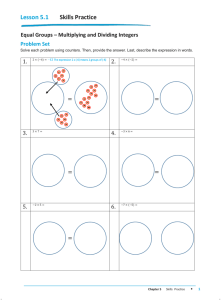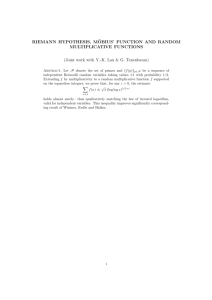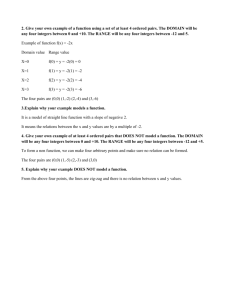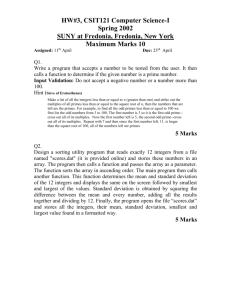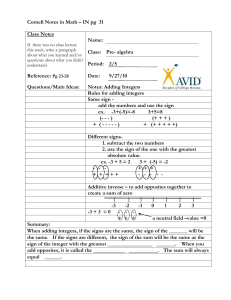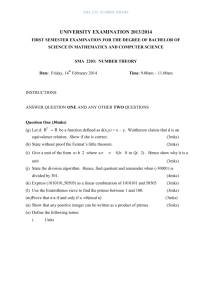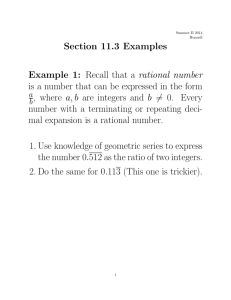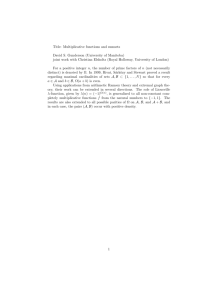Multiplicative functions satisfying the equation $ f (m\ sp 2+ n\ sp 2
advertisement
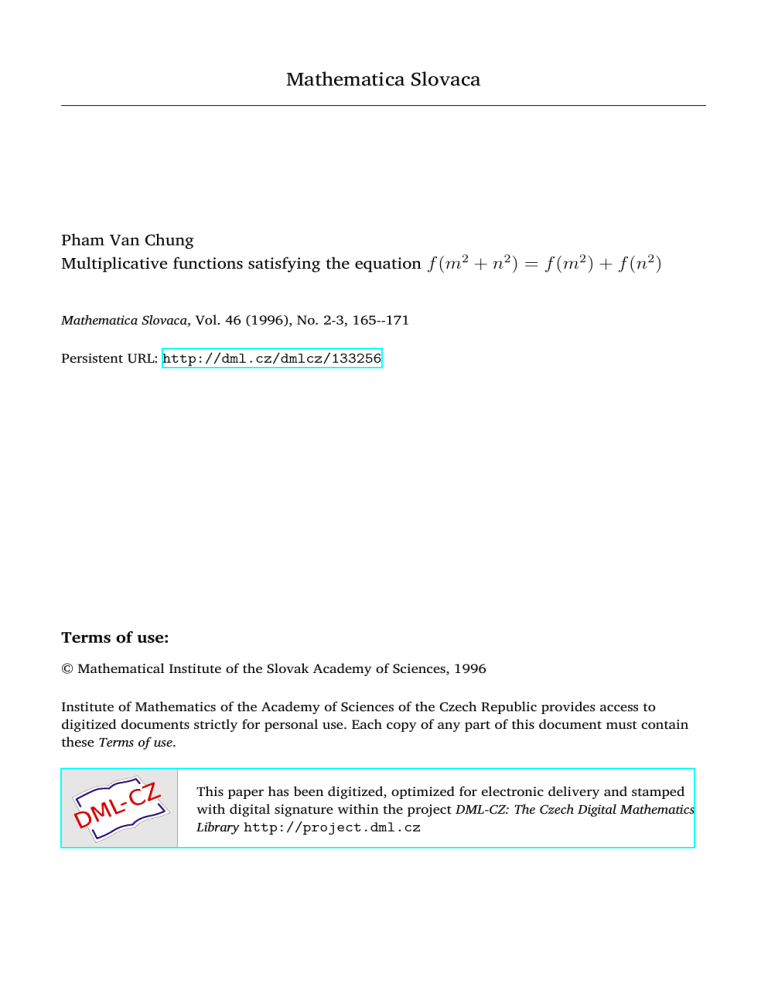
Mathematica Slovaca
Pham Van Chung
Multiplicative functions satisfying the equation f (m2 + n2 ) = f (m2 ) + f (n2 )
Mathematica Slovaca, Vol. 46 (1996), No. 2-3, 165--171
Persistent URL: http://dml.cz/dmlcz/133256
Terms of use:
© Mathematical Institute of the Slovak Academy of Sciences, 1996
Institute of Mathematics of the Academy of Sciences of the Czech Republic provides access to
digitized documents strictly for personal use. Each copy of any part of this document must contain
these Terms of use.
This paper has been digitized, optimized for electronic delivery and stamped
with digital signature within the project DML-CZ: The Czech Digital Mathematics
Library http://project.dml.cz
rVbtheiTKtfica
Slovaca
©1996
_,
. - / „ - - „ v ».
« « -,-r- .,---1
Math. Slovaca, 46 (1996), NO. 2 - 3 , 165-171
Mathematical Institute
Slovák Academy of Sciences
Dedicated to Professor Tibor Salát
on the occasion of his 70th birthday
MULTIPLICATIVE F U N C T I O N S SATISFYING
THE EQUATION f(m2 + n2) = f(m2) + f(n2)
PHAM VAN CHUNG
(Communicated by Stanislav
Jakubec )
A B S T R A C T . In the present paper, we characterize multiplicative and completely
multiplicative functions / which satisfy the equation / ( r a 2 + n 2 ) = / ( m 2 ) + / ( n 2 )
for all positive integers m a n d n .
1. Results
A multiplicative function is a function / defined on the set of positive integers
such that f(mn) — f(m)f(n)
whenever the greatest common divisor of m and
n is 1.
The function is called completely multiplicative if the condition f(mn) —
f(m)f(n)
holds for all m and n .
C l a u d i a A. S p i r o [2] proved that if a multiplicative function / satisfies
the condition f(p + q) = f(p) + f(q) for all primes p , q and f(pQ) ^ 0 for at
least one prime p01 then f(n) = n for each positive integer n .
Replacing the set of primes by the set of squares, we investigate the multiplicative functions satisfying the equation f(m2 + n 2 ) = f(m2) + f(n2) for all
positive integers m, n. We prove the following result.
THEOREM. Let f ^ 0 be a multiplicative function.
tion
Then f fulfills the condi-
(E) / ( m 2 + n 2 ) = / ( m 2 ) + / ( n 2 )
A M S S u b j e c t C l a s s i f i c a t i o n (1991): P r i m a r y 11A25.
K e y w o r d s : multiplicative function, characterization.
165
PHAM VAN CHUNG
for all positive integers m and n if and only if either
(E-l)
(E-2)
(E-3)
or
(E'-l)
(E'-2)
(E'-3)
f(2k) = 2k for all integers
k>0,
f(pk) = pk for all primes p = 1 (mod 4) and all integers k > 1.
f(q2k) = q2k for all primes q = 3 (mod 4) and all integers
k>\,
/ ( 2 ) = 2 and f(2k) = 0 for all integers
k>2,
f(pk) = 1 for all primes p = 1 (mod 4) and all positive integers k,
f(q2k) = 1 for all primes q = 3 (mod 4) and all integers k > 1.
COROLLARY. Let / ^ 0 be a completely multiplicative function. Then f satisfies the condition f(m2 + n2) = f(m2) + f(n2) for all positive integers m and
n if and only if f(2) = 2. f(p) = p for all primes p—\ (mod 4) and f(q) = q
or
f(q) — ~q for att primes q = 3 (mod 4).
P r o o f . By the theorem, if a function / is completely multiplicative and
(E) holds, then we have / ( 2 ) -= / ( 1 ) + / ( 1 ) = 2. So the complete multiplicativity
of / gives f(2k) = (/(2)) = 2k for all positive integers k. In this case, the
completely multiplicative function / satisfies (E) if and only if the conditions
(E-l), (E-2) and (E-3) hold. By (E-l) and (E-2), we have / ( 2 ) = 2 and f(p) = p
for all primes p = 1 (mod 4). By (E-3) and the complete multiplicativity of / ,
f(q2) = (f(q))
= q2 follows for all primes q = 3 (mod 4). These prove the
corollary.
•
For the proof of the theorem we need some auxiliary results.
2. Lemmas
In the following, / denotes a multiplicative function for which there exists a
positive integer m 0 with f(mQ) / 0 and
/ ( m 2 + n2) = / ( m 2 ) + / ( n 2 )
(1)
holds for all positive integers m and n.
LEMMA 1. If f satisfies (1), then / ( 2 ) = 2, / ( 9 ) = 2/(4) + 1 and /(25) =
6 / ( 4 ) + 1.
P r o o f . Since / ^ 0 is multiplicative, we have / ( l ) = 1. Therefore, (1)
implies that / ( 2 ) = / ( l 2 + l 2 ) = / ( l ) + / ( l ) = 1 + 1 = 2. Moreover, by (1) and
/(2) = 2 and the multiplicativity o f / , we have / ( 9 ) = / ( 1 0 ) - / ( 1 ) = 2 / ( 5 ) - l =
2(/(4) + / ( l ) ) - 1 = 2/(4) + 1, which implies that /(25) = /(26) - / ( l ) =
2/(13) - 1 = 2 ( / ( 9 ) + / ( 4 ) ) - 1 = 6/(4) + 1.
So the lemma is proved.
•
166
MULTIPLICATIVE FUNCTIONS SATISFYING THE EQUATION f(m2 +n2) = f(m2) + f(n2)
LEMMA 2. If f satisfies (1). then
f(q2k) = f(q2k~2)f(q2)
(2)
for all positive integers q and k.
P r o o f . By (1), we have
f(q2k) + f(q2k~2) = f(q2k+q2k-2)
= f(q2k~2)f(q2
+ l) = /(flr2*"2) [/(?2) + / ( - ) ]
from which the lemma f(q2h) — f (q2k~2)f (q2) follows for all positive integers
q and k. So, the proof of Lemma 2 is completed, and, moreover, by induction,
it gives
f(q2k) = (f(q2))k-
(3)
•
LEMMA 3 . / satisfies (1), then / ( 4 ) = 4 or / ( 4 ) = 0.
P r o o f . By using (3), we have /(16) = ( / ( 4 ) ) 2 . On the other hand, by (1),
we obtain /(16) = /(25) - / ( 9 ) . From Lemma 1, it follows that /(16) = 4 / ( 4 ) .
Thus we have ( / ( 4 ) ) 2 = 4 / ( 4 ) , from which / ( 4 ) = 4 or / ( 4 ) = 0.
So Lemma 3 is proved.
•
LEMMA 4. If f satisfies (I),
then
f[2k)
= 2 f c " 2 /(2 2 )
(4)
for all integers k > 2.
P r o o f . We argue by induction on
obvious.
Assume that n is an integer with n
all integers fc, 2 < k < n. We will show
even, then n + 1 = 2fc, where 2k — 2 <
hypothesis, we have
k. When k = 2 or 3, equality (4) is
> 3, and that f(2k) = 2k~2f(22)
for
that / ( 2 n + 1 ) = 2 n " 1 / ( 2 2 ) . If n + 1 is
n and k > 2. By (2) and the induction
/(2"+1) = /(22fc-2)/(22) = 22fc-4/(22)/(22) = 22fc-4(/(22))2 .
Equality ( / ( 2 2 ) ) 2 = 4/(2 2 ) implies that / ( 2 n + 1 ) = 22k'2f(22)
= 2"-1/(22).
n+1
n-1
2
It remains to show that / ( 2
) = 2 / ( 2 ) when n + 1 is odd. If n + 1 is
odd, then n + 1 = 2k + 1, and so 2k = n. Thus (1) gives that
f(2n+1)
= /(2 2 f c + 22fc) = /(2 2 f c ) + /(2 2 f c ) = 2/(2 2fc ) = 2 • 2 2 f c - 2 / ( 2 2 ) .
So / ( 2 " + 1 ) = 2 n " 1 / ( 2 2 ) , which proves the lemma.
•
167
PHAM VAN CHUNG
LEMMA 5. If f satisfies (1) and /(4) = 4, then
f(m2)
for all positive integers
= m2
(5)
m.
P r o o f . We shall prove the lemma by induction on m. The lemma is clear
for the cases m = 1,2,3. Assume that M is an integer with M > 3 , and that
/ ( m 2 ) = m 2 forall m<M.
We will show / [ ( M + l) 2 ] = ( M + l ) 2 . If M + l is
fc
even, then M + 1 = 2 ra, where m < M and m is odd. By the multiplicativity
of / , Lemma 4, / ( 4 ) = 4, and the induction hypothesis, we have
/ [ ( M + l) 2 ] = f(22km2)
= f(22k)f(m2)
= 2 2 / c ~ 2 /(2 2 )m 2 = ( M + l ) 2 .
If M + 1 = q is odd, then we can write
q2 + 1 = 2
mMvr
where —-— are integers.
Since ^9 ±—1 < M and (2,
Q
j ~ ) = 1, we obtain that
(fí^PгП-KmV/fPг)
m+íV)' r + i,
/(<72) + l = / ( 2 ) /
from which /(r/ 2 ) = r/2, i.e., / ( ( M + l ) 2 ) = ( M + l ) 2 follows, which completes
the proof of the lemma.
D
LEMMA 6. / / / satisfies (1) and / ( 4 ) = 4, then
/ ( / ) - /
(6)
for all primes p = 1 (mod 4) and all positive integers
k.
P r o o f . Since p = 1 (mod 4), there exist positive integers x and y such
that
p
2 ,
2
aг + зГ
(see [1; p. 298]). So, from Lemma 5, we get
f(pk) = /Or2 + y2) = f(x2) + f(y2) = x2 +
y2=pk
D
168
MULTIPLICATIVE FUNCTIONS SATISFYING THE EQUATION f(m2 + n 2 ) = f(m2) + f(n2)
LEMMA 7. If (1) holds and / ( 4 ) = 0, then
f(m2) = 1
for all odd positive integers
(7)
m.
P r o o f . First we note that, using Lemma 4, / ( 4 ) = 0 implies f(2k) = 0
for all k > 2, which, with the multiplicativity of / , implies that f(x2) = 0 if x
is even.
Equality (7) is true for m = 1. Let m be an odd integer m > 3 . Assume
that f(n2) = 1 for all odd integers n , 1 < n < m. We have
f(m2) = 2
- 1,
where
w
j
: 1
< m,
and so
' 2f((^±^)2)-l
if m = l ( m o d 4 ) ,
2
/(m )
2/((î?
^ )
2
) - l
ifm = 3(mod4).
Using the induction hypothesis, one easily completes the proof of Lemma 7.
•
LEMMA 8. If (1) holds and f(4) = 0, then
f(pk)
= 1
for all primes p = 1 (mod 4) and for all positive integers
(8)
k.
P r o o f . Since p = 1 (mod 4), there exist positive integers x and y such
that pk = x2 + y2, where x is even and y is odd, from which by (1)
f(pk) = f(x2) + f(y2)
follows. By (7), we have f(y2) = 1. On the other hand, we have shown in the
proof of Lemma 7 that f(x2) = 0.
So f(pk) = 1 and Lemma 8 is proved.
•
3. Proof of the Theorem
First, we verify the necessity of the conditions.
If / fulfills the conditions of Theorem, then, by Lemma 3, / ( 4 ) may take
only the values 4 or 0. If / ( 4 ) = 4, then, by Lemmas 4, 6 and 5, the conditions
(E-l), (E-2) and (E-3) are satisfied. If / ( 4 ) = 0, then, in Lemmas 1, 4, 7 and 8,
we have proved the conditions (E'-l), (E'-2) and (E'-3). So we have proved the
necessity of the conditions.
169
PHAM VAN CHUNG
Conversely, suppose that either the conditions (E-l), (E-2), (E-3) or (E'-l),
(E'-2), (E'-3) are satisfied for a multiplicative function / .
It is well known that, if M = m 2 + n2, then we can write
M = 2kp^...p«lql^
...q2/*,
(9)
where p{ and q• are primes, pi = 1 (mod 4) and q- = 3 (mod 4) for i =
1 , 2 , . . . , / and j = 1, 2 , . . . , s and k > 0. Suppose that (E-l), (E-2) and (E-3)
are fulfilled. Then, by the multiplicativity of / , we have
f(m2 + n2) = f(2k)f(p^)...
f(p?)f
= m2 + n2 = f(m2) +
(<£*)...
f{iff')
f(n2).
So we have shown that / satisfies (E).
Finally, suppose that (E'-l), (E'-2) and (E'-3) hold for the multiplicative
function / . Now we consider the values of f(m2 + n2).
By (9), the multiplicativity of / , and (E'-2), (E'-3), we have
/ ( m 2 + n2) = /(2fc).
If k = 0, then exactly one of the two integers m and n is odd. We may
assume m is even and n is odd. So, as above f(m2) = 0, and, by (E'-3), we get
f(n2) = l.
Thus f(m2 + n2) = f(m?) + f(n2) = 1.
If k = 1, then both m and n are odd. By (E'-3), f(m2) = f(n2) = 1, from
which we obtain
f(m2
+ n2) = f(m2)
+ f(n2) = 2.
If k > 2, then both m and n are even. (E'-l) and the multiplicativity of /
imply f(m2) = f(n2) = 0, which gives the equality
/ ( m 2 + n2) = / ( m 2 ) + / ( n 2 ) = 0.
This completes the proof of the theorem.
Acknowledgement
The author would like to thank the referee for many valuable remarks and
comments.
170
MULTIPLICATIVE FUNCTIONS SATISFYING THE EQUATION / ( m 2 + n 2 ) = /(m 2 ) + /(n 2 )
REFERENCES
[1] H A R D Y , G. H . — W R I G H T , E. M . : An Introduction to the Theory of Numbers, Clarendon
Press, Oxford, 1938.
[2] S P I R O , CLAUDIA A . : Additive uniqueness sets for arithmetic functions, J. Number T h e ory 4 2 (1992), 232-246.
Received J a n u a r y 7, 1994
Revised December 14, 1994
Teacher's Training College
Department of
Mathematics
Lednyka u. 4
H-3301 Eger Pf: 43
HUNGARY
171
